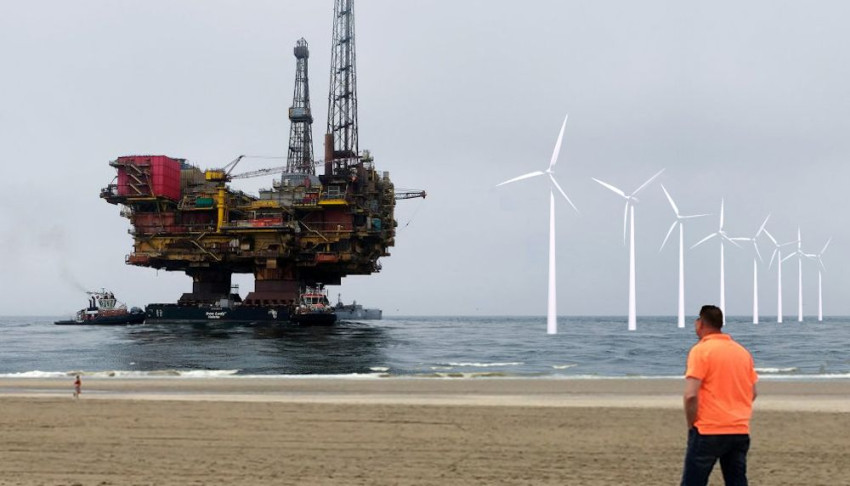
Fossil fuel springboard for sustainable alternatives
Companies such as Shell, Gasunie and NOGEPA regard themselves as springboards for the energy transition to sustainable alternatives, according to the KIVI conference titled Moving away from fossil fuels.
Transition management, that studies the change from one system to another, such as that of energy transition from fossil fuels to sustainable alternatives, is a discipline in its own right. In the Netherlands, Jan Rotmans is one of the high-profile professors. His main premise is: such change is first introduced by pioneers, whereby the existing system mainly raises obstacles. The pioneers subsequently gain momentum and the representatives of the old system gradually adapt, initially cautiously and in time enthusiastically.
Change creates opportunities
The latter became apparent at the Moving away from fossil fuels conference organised by the Royal Dutch Institute of Engineers (KIVI) in the hall of The Hague University of Applied Sciences on 1 May. Jeroen van der Veer, former CEO of Shell: 'Companies only flourish when they react effectively to change. The energy transition creates opportunities both for the old fossil fuel industry and for start-ups.' Marjan van Loon, the current president director of Shell Netherlands: 'Don't abolish the old to start something new (i.e. sustainable), but rather utilise the old to jump-start development of the new.' And Jo Peters, secretary general of NOGEPA (Netherlands Oil and Gas Exploration and Production Association): 'Rather than demolishing everything, we need to identify commonalities between the old and new energy technologies.'

Van Loon provided a number of examples. Shell is involved in wind at sea. 'We have expertise in offshore installations.' Shell is to install super speedy chargers at 25 of its fuel stations to get electric cars back on the road within 15 minutes. The Shell site in Moerdijk is to have 50,000 solar panels fitted. In Germany, the company is applying its experience in process technology in order to produce hydrogen.
Berend Scheffers of EBN (Energiebedrijf Nederland, partner in the gas and oil projects) announced a plan for the large-scale application of geothermal energy. 'We have expertise in safe drilling.' He also announced that an investment decision was due next year regarding the storage of CO2 from the Rotterdam industrial complex in empty gas fields.
Ulco Vermeulen of Gasunie is targeting green gas. He advocated the cultivation of algae in solar parks and between the wind turbines at sea. He also spoke out in favour of converting sustainably generated electricity into hydrogen, for example. 'Both the storage and transport of gas is considerably less expensive than storage and transport of electricity.' Gasunie is very willing to deploy its existing gas infrastructure for that purpose, and is currently already involved in the storage of hydrogen in an underground salt cavern.

Representatives of more uninhibited approaches to sustainable energy were also present. Allard van Hoeken, of the Bluewater offshore company, is applying his know-how to install solar panels at sea, Jan van der Tempel hopes to install a wind turbine that powers a generator via hydraulic pressure this summer, while Professor Paulien Herder is coordinating research at Delft University of Technology on the matter of energy transition.
Transition is essential
The need for the energy transition is commonly accepted by the fossil fuel firms by now. Shell director Marjan van Loon: 'We've committed to the Paris targets and we want to help achieve them.' Jo Peters of the NOGEPA: 'We need to work on the energy transition.' Jeroen van der Veer: 'In the Netherlands, I have a reputation as a fossil dinosaur, but I'm seen as a pioneer at the World Economic Forum, where I'm chairman of the Future Energy working group.
Similar intentions were logically heard from companies that profit directly from the energy transition. Network manager TenneT is to invest around 28 billion euros in expanding the high-voltage network over the coming 10 years, while Siemens is working on the electrification of our energy system in every possible way. Hans Winters, the new CEO of Siemens Nederland, defined it as follows: 'It's neither the technology nor the financing that is the issue for the energy transition process. Funds are all too willing to make sustainable investments. The real problem lies with us: do we really want to change, can we accept a wind turbine in our back garden or solar panels in the fields? As engineers, are we not stuck in the old technology rut, and do we dare to move strongly against the flow?'
Fossil fuel still necessary for now
Another message became clear at the conference: the energy transition is essential, but fossil fuels cannot be discarded any time soon. China is making enormous investments in wind and solar energy for example, with currently tens of gigawatts of power, but the volume of coal is still 100 times greater, according to Lucia van Geuns, Energy adviser at The Hague Centre of Strategic Studies. She showed graphs of the energy systems of various continents and large countries, and none of them will have attained one hundred percent sustainable energy by 2050; they will achieve half of the total energy supply at best. 'We're still dependent on fossil fuels for now,' was her conclusion after presenting a series of such graphs.
Jeroen van der Veer referred to the Sky scenario recently published by Shell. 'This is no wishful thinking scenario that presents us with a fully sustainable energy system in the short term, but rather a realistic scenario. It then becomes apparent that oil and gas have yet to peak and will only gradually relinquish their share.' In other words: there is still work to be done in the fossil fuel world.
As already mentioned, the fossil fuel firms also regard the energy transition as an opportunity for new business. That was most effectively summarised by Arnout de Pee of McKinsey. 'The Netherlands has much to gain from increased sustainability: we're favourably located for the storage of CO2, our energy-intensive industry is located in close proximity of one another, we have a great location for wind at sea and we're good at system integration.' And so the inevitable conclusion is a variant on the motto of the conference: Moving away from fossil fuels is the best way forward.
Lectureship in energy transition
The Hague University of Applied Sciences is to introduce a lectureship in energy transition in collaboration with KIVI. This was announced by Nellie van de Griend, director of the faculty of Technology, Innovation and Society of The Hague University of Applied Sciences, and Gerald Schotman, president director of KIVI. The two organisations hope this will encourage systematic education in this field.
If you found this article interesting, subscribe for free to our weekly newsletter!






